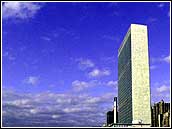| UN
History | |

For more than 50 years the United Nations has struggled as an international governing body trying to forge
peace, end poverty and heal the world.
|
|
Feb. 11, 1945
U.S. President Franklin D. Roosevelt, Russian Prime Minister Joseph Stalin and British Prime Minister Winston Churchill agree at Yalta to establish a body devoted to fostering international
peace. |
|
Oct. 24, 1945
The U.N. charter is signed in San Francisco with the stated goal to build communication and cooperation between nations. It is headquartered in New York City and has major offices in Geneva and Vienna. The United Nations superceded the League of Nations, which was established in 1919 to help end World War I. The name 'United Nations' originally referred to those countries allied against Germany, Japan and Italy in World War II. |
|
1945
Originally founded in 1899, the International Court of Justice comes under the purview of the United Nations. The court's decisions are legally binding, but member nations must submit cases to the court. In numerous instances, member countries have resisted giving the court jurisdiction over sensitive domestic political issues, which has limited the court's influence. |
|
1948
The United Nations establishes the World Health Organization (WHO). The WHO has three main functions: To act as a health information clearinghouse; to study and combat epidemics; and to foster member countries' internal health-oriented bureaucracies. |
|
Dec. 10, 1948
U.N. members sign the Universal Declaration of Human Rights.
|
|
June 1950
With the Soviet Union boycotting the United Nations over the West's refusal to admit communist China, the United States is successful in pushing through a resolution to have U.N. troops defend South Korea against North Korea. The United States fought under the U.N. banner in the Korean War until a cease-fire in 1953.
|
|
1953-1961
Under Secretary-General Dag Hammar-skj÷ld, the United Nations begins its tradition of peacekeeping. U.N. soldiers, called "blue helmets," are sent into trouble spots that often act as buffers between warring factions. Regions where peacekeepers have worked are the Middle East and, more recently, Africa and the Balkans.
|
|
Sept. 18, 1961
Hammars-kj÷ld dies in an air crash while on a mission in the Congo.
|
|
1955
Tensions between East and West, i.e. the Soviet Union and Western Powers, yield gridlock in the process of admitting new nations to the United Nations for the first 10 years of its existence. For a nation to be admitted, the U.N. Security Council and two-thirds of the General Assembly had to approve. In 1995, 16 new countries were admitted in a package deal. |
|
1955-1960
Forty new countries are admitted during this growth period. |
|
1960
The Declaration on the Granting of Independence to Colonial Countries and Peoples helps bring U.N. membership to 150 countries by the end of the 1970s. |
|
1965
The Security Council format is amended to include the five permanent nations and 10 nonpermanent members: five from African and Asian states, one from eastern European states, two from Latin-American states and two from western European and other states.
|
|
1970
Around this time, World Bank lending shifts away from infrastructure and toward agriculture and education programs in Third World countries. The World Bank is the international lending arm of the United Nations. |
|
1971
After the United States drops its 21-year opposition, the People's Republic of China is admitted to the United Nations and is given permanent Security Council status.
|
|
1975
The first international conference on women is held in Mexico City. |
|
1988
U.N. peace-keepers en masse are awarded the Nobel Peace Prize.
|
|
November 1990
The United Nations authorizes member states to use all necessary force to push back Iraq's occupation of Kuwait. On Jan. 15, 1991 the Gulf War begins.
|
|
Early 1990s
As former Soviet satellite countries and the divided Koreas are admitted, the U.N. membership tally reaches 175.
|
|
1992
First U.N. "Earth Summit."
|
|
1995
Observance of the 50th anniversary of the signing of the U.N. charter.
|
|
1996
The United Nations opens the Comprehensive Nuclear Test Ban treaty for member ratification. As of late 2001, the United States still hadn't signed.
|
|
Sept. 6-9, 2000
The United Nations holds a millennium summit, with the largest assembly of world leaders ever. Heads of state from more than 150 nations meet to discuss a wide range of issues and adopt the so-called Millennium Declaration. |
|
Oct. 12, 2001
The Nobel Peace Prize is awarded to the United Nations and Secretary-General Kofi Annan - four months after he was elected unanimously by the 189-member General Assembly to a second 5-year term - for their roles at the "forefront of efforts to achieve peace and security in the world."
| 
|
|











































